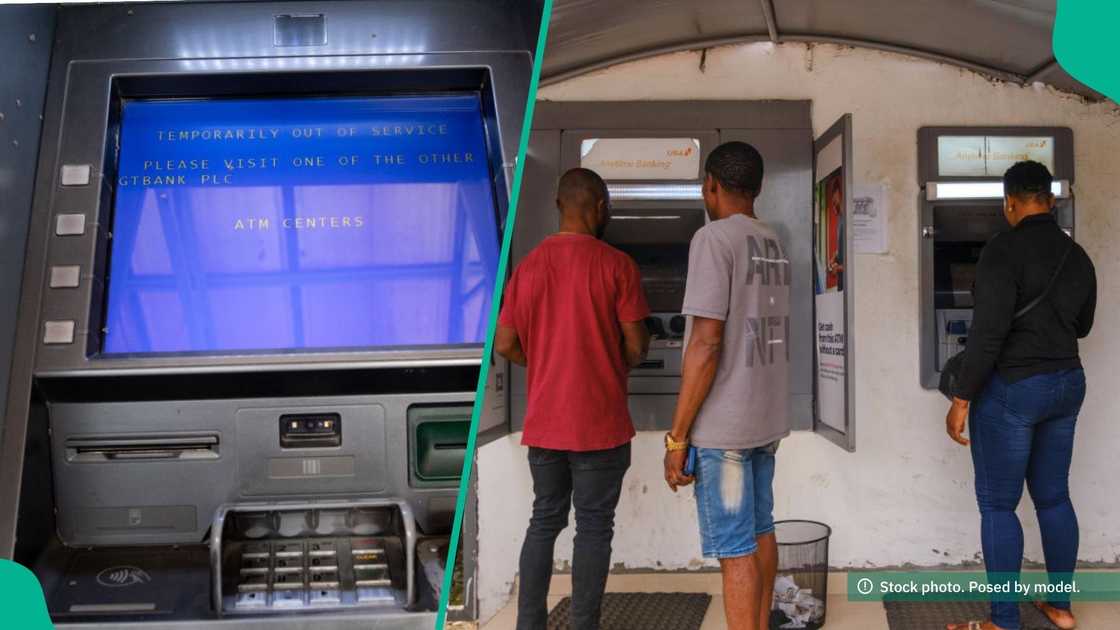Good News for Customers as CBN Announces New Rules for ATM Transactions, Banks Must Obey
- The Central Bank of Nigeria has released new guidelines for ATM transactions for banks in Nigeria
- Under the new guideline, the apex bank instructed that failed ATM transactions must be refunded within 24 hours
- Banks and ATM operators must deploy systems that automatically reverse failed or partial transactions without requiring customer complaints
Legit.ng journalist Dave Ibemere has over a decade of experience in business journalism, with in-depth knowledge of the Nigerian economy, stocks, and general market trends.
The Central Bank of Nigeria (CBN) has directed Deposit Money Banks and other financial institutions to refund customers within 48 hours for failed Automated Teller Machine (ATM) transactions.

Source: Getty Images
The directive was contained in a draft guideline released on Saturday, October 11 titled Exposure of the Draft Guidelines on the Operations of Automated Teller Machines in Nigeria.
The document, signed by Musa I. Jimoh, Director of the Payments System Policy Department, was circulated to banks, payment service providers, card schemes, and independent ATM deployers, inviting stakeholder feedback by October 31, 2025.

Read also
Banking without sleep: FirstBank unveils 24-hour digital hub, signals major shift in banking
According to the apex bank, the move followed widespread complaints over delayed refunds and poor service delivery.
It is also part of ongoing efforts to modernise Nigeria’s payment systems and align them with global best practices.
New ATM rules for banks
Under the new rule, failed “on-us” transactions, where customers use ATMs belonging to their own banks, must be reversed instantly.
If technical issues prevent immediate reversal, banks must manually refund affected customers within 24 hours.
For “not-on-us” transactions conducted on other banks’ ATMs, refunds must be processed within 48 hours.
The circular stated:
“Customers must not be made to suffer for failed transactions caused by system errors or network failures."
The CBN also ordered banks and ATM operators to deploy technology that automatically reverses failed or partial transactions without requiring customer complaints.
Institutions holding customer funds due to failed disbursements must reconcile and refund balances immediately.

Read also
Power Minister blames DisCos for Nigeria's electricity failures, threatens license revocation
Other new rules for banks for ATM
The guidelines also set new standards for ATM operations nationwide. Banks and card issuers must deploy at least one ATM for every 5,000 active cards, with compliance targets of 30% by 2026, 60% by 2027, and 100% by 2028.
Any new deployment, relocation, or decommissioning of ATMs must receive CBN approval.
To enhance safety and accessibility, all ATMs must be equipped with anti-skimming devices, CCTV cameras, and installed in enclosed or well-lit areas.
Machines must comply with Payment Card Industry Data Security Standards, maintain audit logs, display helpdesk contacts, and ensure that at least 2% of deployed ATMs are accessible to visually impaired users.

Source: Getty Images
The draft also mandates that ATMs dispense cash before returning cards, allow free PIN changes, issue receipts for all transactions except balance inquiries, clearly display transaction fees, dispense only clean banknotes, and provide backup power to reduce downtime.
The CBN also stated that downtime must not exceed 72 consecutive hours, after which operators are required to publicly disclose the cause and the expected restoration time, Punch reported.
The apex bank added that it will monitor compliance through audits, inspections, and monthly reports from ATM operators, with sanctions for defaulters, though specific fines were not disclosed.
Banks reap N14tn from loans to customers
Earlier, Legit.ng reported that nine leading banks in Nigeria earned a total of N14.26 trillion in interest income in 2024, a sharp rise compared to the N6.49 trillion they recorded the year before.
This income came from loans they gave to customers, according to their audited financial statements submitted to the Nigerian Exchange Limited.
According to the Corporate Finance Institute, interest income is the amount paid to an entity for lending its money or letting another entity (individual or corporate) use its funds.
Proofreading by Funmilayo Aremu, copy editor at Legit.ng.
Source: Legit.ng



